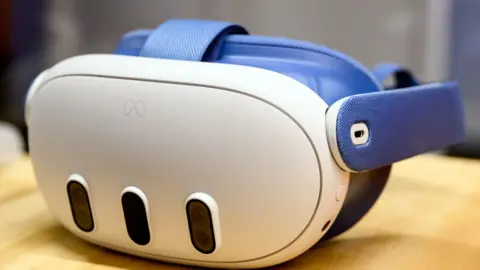Meta: Can the firm's new headset stop virtual reality sickness?
 BBC
BBCThe first time I tried virtual reality (VR) I chose to play a rollercoaster game - and almost instantly regretted it.
I suddenly felt sick, ripping off the headset but the nausea stayed with me for hours.
It was a rookie error. The disconnect between what my eyes saw and my body felt was too much.
I've since discovered I can play gentler, less disorientating games, but the nausea still begins to creep in.
Sickness in VR affects a lot of people so finding a solution is critical if Mark Zuckerberg's ambition to create a "metaverse" that people actually want to spend time in is to be realised.
The boss of Meta, which owns Facebook and Instagram, said last year that while motion sickness was still the "biggest issue" facing VR but claimed "it is getting better".
So it that true?
Meta is set to launch its latest headset, the Quest 3 and, in the interest of research, I strapped it on and waited to feel sick.
Unlike the last version, the Quest 3 has cameras that allow the user to see through the headset to the real world in full colour.
It means games can be played virtually but set in your physical surroundings. Think of a digital character sitting on your coffee table and you've got the idea.
This isn't the first "mixed reality" headset but it is the first affordable-ish one at $499 (£411).
Happily, the nausea remained at bay.
I started off with a showcase for the tech called First Encounters.
It began in the room I was standing in. As I shot projectiles, the walls crumbled, revealing a virtual world that I could peer into. Small green furballs began to jump at me.
I could see people in the room as I was playing and see the walls. I could move around in my surroundings confidently.
The same held true as I tried Stranger Things - a mixed reality game version of the hit Netflix series. I didn't feel sick at all.
Chris Cox, chief product officer at Meta, said that mixed reality "changes drastically how comfortable the [VR] experience is".
His team knows "context switches" - from reality to VR - "can be tough".
But here's the thing: if the solution to solving VR sickness is to avoid playing full VR is that really a fix?
 Getty Images
Getty ImagesMr Zuckerberg thinks motion sickness can be reduced with better graphics and less latency (the delay between doing something and seeing it on the headset).
He hopes that the better the headsets get, the fewer people will report problems.
But part of feeling ill is based simply on your eyes seeing things that the rest of your body isn't experiencing.
So I had a go at a completely virtual reality boxing game. I pulled the headset over my eyes, and suddenly my surroundings were gone.
I played for a few minutes, punching imaginary targets. The graphics felt crisper - light-years ahead of earlier models. But for me, it was still not enough.
I didn't feel sick, but an unwanted dizziness began to creep in, meaning my brain was still telling me that it is not enjoying the experience.
As Mr Zuckerberg acknowledges, people experience motion sickness differently. Some people get sea sickness, and some don't.
Some people play VR for hours on end without a problem. But I can't.
Mixed reality is still very new, with few games. But maybe it is the solution for people like me who like the idea of playing games virtually - but haven't the stomach for it.
